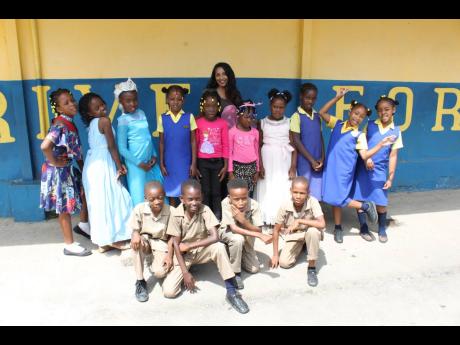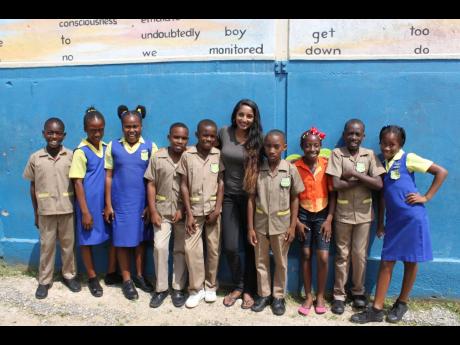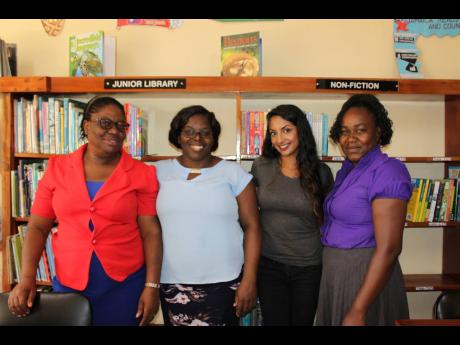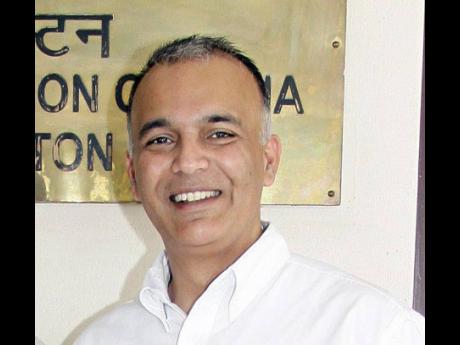Enriching young minds
“I subscribe to the sayings of great leaders who maintain that all children are our children,” said Paul Sully, country director of Peace Corps Jamaica. “My years in the Peace Corps have taught me the tremendous value of engaging young people in service. Doing service teaches us many things and one of the biggest is our connectedness with one another.”
Sully’s words are thought-provoking, and critically, call for conversations and actions around the value of service and how it can be popularised, inculcated, and imbibed in the Jamaican context.
He is upbeat about the prospects.
“Volunteerism and service is everywhere in Jamaica,” Sully said. “I believe it can be in more places if we adopt technology to bring those who wish to volunteer to the places that need the support.”
“To me,” said Sully. “Many Jamaicans understand service. The Council of Voluntary Social Services is nearly 80 years old. They know service. Schools and universities that require service as part of their course or graduation requirements understand service.
“We need stronger systems in place that can channel the supplies to the needs,” he said.
Off the beaten path, in James Hill, Clarendon, a group of James Hill Primary School children ran and hugged Radhika Patel, Peace Corps Volunteer (PCV), excited to see her and also wanting to know when they would be getting together to read stories.
Patel, who has been serving in the community for the last two years, said that apart from reading stories to children, she would speak about philosophy, encourage them to think outside of the box, and learn teamwork and mutual respect.
Quote Gandhi
“I often quote Gandhi,” said Patel. “It helps me to give context, affirm what I am saying, and also helps the kids to find a common ground to work together.”
Quoting and emulating the teachings of India’s Father of the Nation might come easy for Patel, a second-generation Indian born and raised in Corona, California, after all, her family comes from the same state that Gandhi did.
That genetic pool romanticism aside, Patel’s approach has made these children come out of their shell, become expressive and resolve their differences by conversing rather than being aggressive.
The children’s sentiments are shared by the staff of the James Hill Branch Library, which is in the vicinity of the James Hill Primary, where Patel organises all the after school activities.
“Rad (Radhika) is a constant source of inspiration for us all,” said Sasha-Gayle Staple, library assistant at the James Hill Branch Library. “It speaks volumes that the sessions (with the school children) are for one hour, but they tend to be here for a longer duration.”
A philosophy major, Patel uses her knowledge of the subject area to plan activities. She started a philosophy club. “I employ the use of epistemology, metaphysics, logics, ethics, and Morality to teach them,” she said.
“I would have classes where I have the kids do activities in which they question their own reality,” Patel said. “For instance, I would introduce the concept that life may be a video game as a thought experiment and introduce the simulation theory as a result.
“For another class, I would introduce the mind/body problem and open up the discussion on whether the mind and body are separate things or one. I would talk about the phantom limb experiment and actually do the experiment so the children can get a first-hand experience of the mind/body disconnect.”
She has engaged in fun activities, too.
A trained kathak (a classical North Indian dance form) dancer, Patel has taught some of those moves to the girls in the communities, complemented by belly dancing and hip hop.
Apart from these interventions for the children, Patel said that she has encouraged the community to look into the preservation of their produce, initiated an aquaponics facility, and experimented with the use of bamboo, which is abundant in the area, to make straws and jewellery.
Blueprints
“She has created and is leaving behind the blue prints so we can develop agriculture best practices in James Hill,” said Carmen Dillion, president of the Community Development Committee.
Ready to head back to California now, Patel says it is gratifying to see that the work that she has initiated is bearing fruit. She would like to sustained.
She said that it is important that the community be proactively involved and also that there be a concerted effort to groom the youngsters within the community to carry on the works initiated by her and other PCVs across the island.
“It is very important to encourage youngsters to develop the spirit of giving back,” Patel said. “This is an investment for their future, the future of the community, and Jamaica.”
Patel started young, too. She was the president of Global Environmental Brigades and on the board of Global Medical Brigades during college.
Being a PCV has been an enriching experience, she said, having worked with Gibbons with mental disorders and abused elephants in Thailand, in medical clinics in Nicaragua and Honduras, in Ghana for a global health internship, rainforest research in Costa Rica, and helped an indigenous tribe in Panama with their environmental needs.
She would love to see the children emulate the life lessons that she is leaving behind. The bigger picture here is to see how such volunteering initiatives can reap rewards.
“While I am a believer in market economy, not all things that make societies great have a price tag or can be monetised,” Sully said. “I see how volunteerism enriches with purpose. The actor and the receiver “meet” and connect. Good things can flow from those connections.
“In academic circles, this is called social capital,” he said.
Radhika’s story is one that can be replicated in many manifestations – to embrace service as a part of life, use those experiences to introspect, tweak one’s outlook to life and to help in one’s own way to create unifying ground among the diverse and oft-divided human race.
Patel has found that common ground, of rediscovering herself, and leaving a long-lasting legacy.
“Words cannot describe how I feel about Jamaica,” said Patel. “It is my forever home. Wherever I am and no matter how old I am, I will always be coming back.”
Her sentiments cannot be fathomed in monetary value. It is a labour of love. Let it flow.





